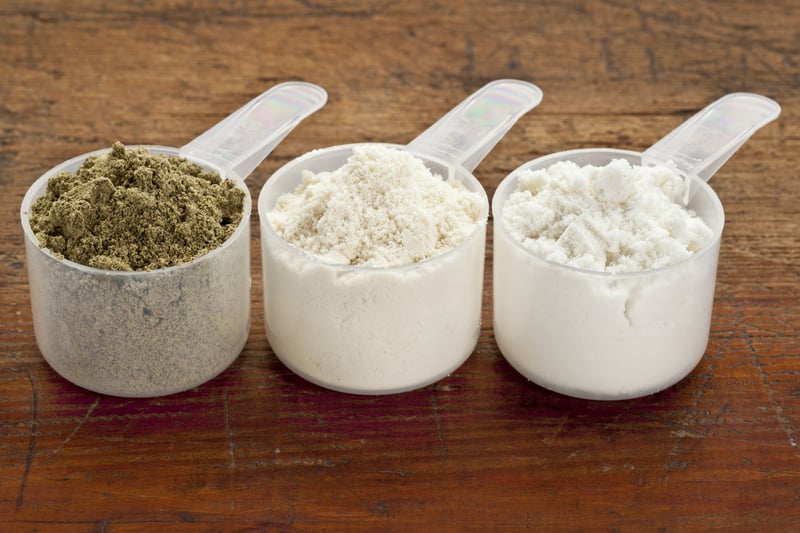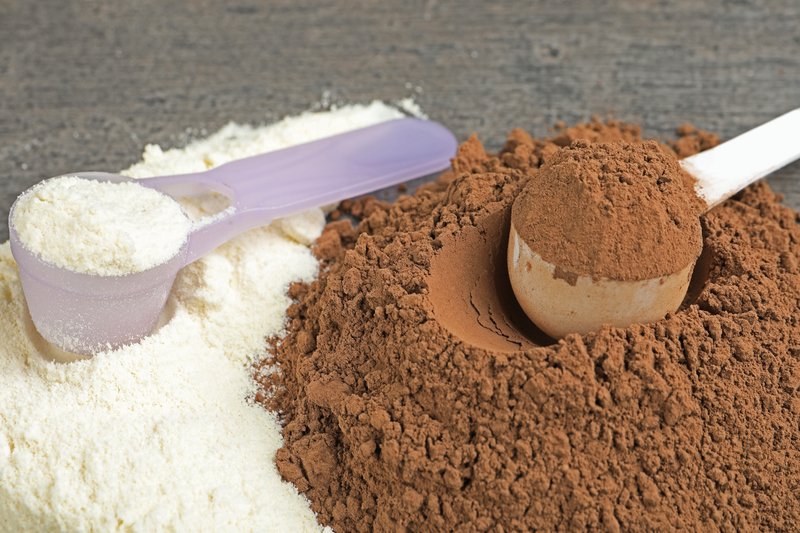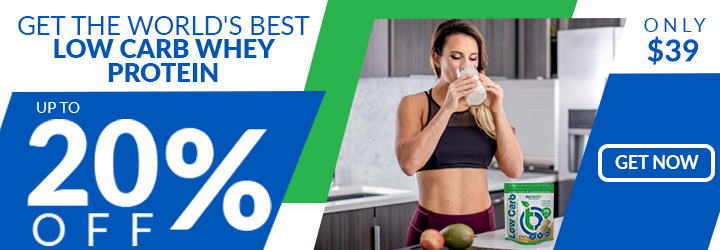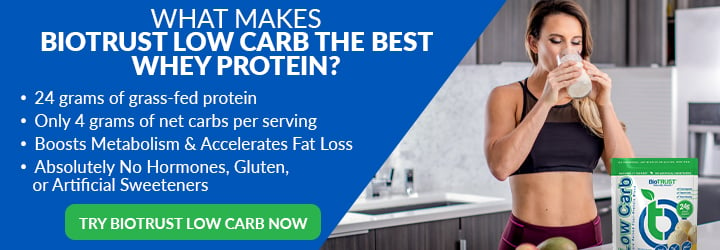The 5 Best Types of Protein Powder (and 3 To Avoid)

If you’re interested in getting and staying lean, strong, healthy, and fit, chances are pretty good that protein is the top macronutrient on your list. But it’s not always easy to base an entire meal around a protein source, let alone hit that all-important daily protein target with food alone. That’s where protein powders come in and why they have become so popular for just about anyone and everyone interested in boosting their health and fitness. There’s a number of different types of protein powders, which can come from a variety of sources. The question then becomes what’s the best protein powder for your goals?
Of course, it is possible to get enough protein from whole food sources (e.g., meat, eggs, poultry) and not need a protein powder at all. That said, to optimize protein levels—especially for people who are exercising regularly, watching calories, are too busy to prepare and cook meals throughout the day, and/or don’t eat much meat—quality protein powders can be a highly convenient, affordable way to get the protein you need to reach your goals.
Protein powders are also low in calories, fat, and carbs, so you get the protein you need without anything you don’t. Plus, the right low-carb protein powder should taste delicious and be versatile enough to enjoy consuming every day. You can easily personalize a protein powder shake or smoothie by adding vegetables, fruits, and other ingredients to increase the nutrient density and vary the flavor.
You can even add a scoop or two of protein powder to pancakes, baked goods, smoothie bowls, and more to increase the amount of protein in your favorite foods.
Protein Powder Choices: How to Choose
Protein powders can be made from animal sources, such as dairy and eggs, or various plant-based sources, like soy, pea, hemp, or rice (or more likely a mixture of plant sources). While taste is a top consideration for any protein powder, various products may be more suitable for specific goals as well as timing.
No matter what the protein source is, protein powders typically come in three common forms:
- concentrates
- isolates
- hydrolysates.
Concentrates typically provide around 80% protein and are created by extracting the protein from whole foods via heat and/or enzymes.
Isolates add an additional process to filter out more of the fat and carbs, leaving 90 to 95% protein.
Finally, hydrolysates are isolates or concentrates that are “pre-digested” or broken down into smaller, more readily absorbed peptides. By breaking the amino acid bonds, these protein powders are better absorbed by the body to fuel the muscles. There’s some research showing that whey hydrolysates, for example, may offer greater muscle-building effects than intact whey proteins—even at a potentially lower dose. 1

The 5 Best Protein Powder Choices
Before you pull out the blender or shaker bottle, here’s a rundown of the best protein powder choices and what goals they’re best suited for:
1. Whey Protein Powder
The king of all proteins, whey protein is one of two proteins (the other being casein) derived from milk. During the cheese-making process, liquid separates from the curds, and this liquid is whey. Interestingly, it was once considered a waste product until researchers found that it was liquid gold in terms of protein nutrition.
As mentioned, concentrates contain carbs and fats, and the carb source in whey concentrate is the milk sugar lactose, which can be difficult for some to digest. Whey protein isolate, on the other hand, has all (or at least most) of those sugars removed.
What’s left behind is a protein that’s rich in the muscle-building essential amino acids (EAAs), including the branched-chain amino acids (BCAAs) leucine, isoleucine, and valine. Leucine, in particular, plays a major role in muscle growth and recovery after exercise. 2,3
This partly explains why whey protein is so helpful for building and maintaining muscle mass as well as recovery and strength when combined with resistance training (i.e., weight training). 4-6 In research, whey protein was found to lead to more muscle growth than casein or soy protein due to its faster digestion and absorption as well as its high leucine content. 7,8
Whey protein has other benefits as well. For example, it’s been shown to improve body composition and support weight loss in overweight and obese individuals. 9 This, at least in part, appears to be due to the fact that whey protein has a positive effect on satiety and fullness over other forms of protein, so it could help people simply eat less because they have a decreased appetite. 10-13 Whey protein has also been shown to support antioxidant levels, support healthy levels of inflammation, and improve heart health markers. 14
Whey Protein is Best For:
- Rapid digestion
- Muscle gain and maintenance
- Muscle recovery
- Fat loss
- Improved body composition
- Increased satiety
- Decreased appetite
- Antioxidant support
- Improved heart health markers
2. Casein Protein Powder
The other popular protein derived from milk is casein (or the curd part in the cheese-making process). Casein differs from whey in that it’s digested and absorbed more slowly as it forms a gel when it comes into contact with acids in the stomach. This delays the release of amino acids into the bloodstream. 15
The muscles then enjoy a slow, steady, gradual intake of amino acids, which helps decrease muscle breakdown. This is why casein protein is often recommended to be consumed before going to bed (so the muscles can continue to absorb amino acids and improve recovery as you sleep). 16 Because it digests more slowly, it can also help you feel fuller for longer, which can support fat loss.
Casein Protein is Best for:
- Slowed digestion and release of amino acids
- Decreased muscle breakdown
- Improved muscle recovery
- Fat loss
3. Pea Protein Powder
If you’re vegetarian, vegan, or just want to decrease your consumption of animal products, there are other great options. One of these is pea protein, which is made from a high-fiber legume (split peas) that provides all of the essential amino acids, including the BCAAs.
As far as absorption rate, pea protein lies between whey and casein. That is, it’s absorbed more slowly than whey but more quickly than casein. It’s also been shown to trigger satiety signals, increase muscle size when combined with resistance training, and even reduce blood pressure. 17-19
Pea Protein is Best For:
- Vegetarian, vegan, plant-based diets
- Decreasing appetite
- Increasing muscle
- Blood pressure management
4. Hemp Protein Powder
Another plant-protein powder that’s just recently hit the scene is hemp protein. It’s quickly becoming more popular not only due to its protein content but because it also supplies omega-3 fatty acids.
Because it’s so new, however, there is only limited research on how effective it is. It is, however, well-digested and shows good potential, especially when combined with other plant proteins like pea protein powder. 20
Hemp Protein is Best For:
- Vegetarian, vegan, plant-based diets
- Providing omega-3 fatty acids
- Slower digesting protein
- Decreasing appetite
5. Pumpkin Protein Powder
Protein powder made from pumpkin seeds is high in minerals (e.g., zinc and iron), antioxidants, and vitamins (e.g., B vitamins and vitamins E and K), and it is also a great plant-based protein powder, though it is not a complete protein as it lacks the amino acid lysine. So, if you are considering a protein powder that includes pumpkin protein, it should also be combined with other plant proteins like hemp and/or pea protein powder to optimize the benefits.
Pumpkin Powder is Best For:
Vegetarian, vegan, plant-based diets when combined with other plant proteins
Often, you’ll find a mix of proteins together to supply a better overall protein powder. For example, some “nighttime” protein formulas may provide 80% casein and 20% whey. Or, a post-workout blend could be the opposite. A blend of fast- and slow-digesting proteins can be ideal for a wide range of people—from athletes to aging adults—to support fitness, exercise, weight management, or simply a healthy lifestyle.
Vegetarian protein powders that provide a mix of plant proteins often digest more slowly than animal proteins and often provide more fiber. Adding digestive enzymes may help even the playing field that much more when it comes to digestion and efficacy of plant-based proteins (compared to whey, for example). 21 In addition, a mix of different plant-based protein powders can lead to a better flavor and texture profile that’s not as grainy or earthy.
3 Protein Powder Choices To Skip
While protein powders are a convenient way to increase your protein intake, some are clearly better than others, and you may be better off choosing from the list above or choosing a whole-food option instead of the options below:
1. Egg Protein Powders
Whole food eggs are an excellent source of protein and amino acids, essential omega-3 fatty acids, and fat-soluble vitamins. They’re associated with a wonderful array of benefits like decreased appetite, increased satiety, improved brain, eye, and heart health, and more. Is it the same for egg protein powders? Probably not.
You see, egg protein powders are made from just the egg whites rather than the whole egg, and much of the nutrition from eggs is found in the yolk. Still, egg protein powders do provide a decent quality complete protein, which provides all of the essential amino acids.
There’s currently only limited research on egg protein powder, but what does exist suggests egg protein doesn’t decrease appetite as well as other proteins (including casein or pea). 22 According to one study, it also doesn’t appear to have a positive effect on body composition or muscle strength when compared to other protein powders. 23
Egg protein powder may not be as favorable as some of the milk-based proteins, but for those with a dairy allergy, it does provide all of the essential amino acids and is easily digestible. Just don’t expect it to provide the same overall benefits on appetite, strength, and body composition. If given the option, your best bet is likely to just go with whole eggs instead of an egg protein powder.
2. Brown Rice Protein Powder
Rice protein powders have been on the market for years, but unfortunately, there’s little research available on their effectiveness. In addition, rice does not contain all of the amino acids; in other words, it isn’t a “complete” protein, as it lacks the amino acid lysine.
Rice protein powder appears to be less effective than whey protein for building muscle. Until there is more research available, why not choose a protein powder that has been shown to be effective or at least choose a protein powder with a mix of various plant proteins like those mentioned above?
3. Soy Protein Powder
At first glance, soy protein powder seems to have a lot going for it. It’s a complete protein that’s easy to digest and blends well. And, it’s low in fat, has no cholesterol, and is high in minerals like iron, manganese, and copper. It’s also a convenient alternative if you’re looking for a plant-based protein powder to help support muscle building.
Unfermented soy, however, is controversial for a number of reasons as it has several potential disadvantages. For example, soy protein powders have been shown to impact hormone levels, including inhibiting thyroid hormones and increasing estrogen levels. 24,25 In addition to potentially throwing off hormone balance for men and women, soy protein has also been shown to reduce iron absorption. 26 Last but certainly not least, soy products are overwhelmingly produced from GMO soybeans.
At the end of the day, there are simply better options.
Types of Protein Powder: A Wrap Up
There’s no questioning the benefits of increasing protein intake for most people. And protein powders make it easy and convenient. Yet it’s important to find a quality protein powder that fits your goals and your taste buds. There’s one other consideration: fillers. Many protein powders are filled with chemicals, artificial sweeteners, flavors, colors, preservatives, and other junk you want to avoid. And if you’re looking at a dairy product, you’ll also enjoy a cleaner protein from grass-fed, pasture-raised cows that aren’t exposed to growth hormones, GMOs, antibiotics, or pesticides.
On the other hand, others may have complementary ingredients that make the protein powder better and more gut-friendly by including prebiotics and protein-digesting enzymes.
With the above information, you’re better armed to find the best protein powder for you.








